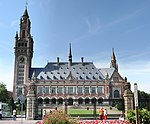Embassy of Sweden, The Hague
The Embassy of Sweden, The Hague is the diplomatic mission of Sweden in The Hague. The Netherlands is the first country with which Sweden exchanged permanent ambassadors, a relationship established in 1614. The embassy's primary role is to monitor, represent, and advance Swedish interests within the Netherlands and international organizations based in The Hague. Its responsibilities include providing services to Swedish authorities, businesses, organizations, and citizens. The embassy regularly reports to the Ministry for Foreign Affairs in Stockholm, offering insights into political and economic developments, as well as the country's stance on global events. A key focus is promoting Swedish economic interests by aiding Swedish companies and attracting foreign investments to Sweden, collaborating closely with Business Sweden in The Hague and the Swedish Chamber of Commerce in Amsterdam. Additionally, the embassy handles consular matters. It also engages in promoting Sweden through seminars, exhibitions, and cultural events.
Excerpt from the Wikipedia article Embassy of Sweden, The Hague (License: CC BY-SA 3.0, Authors).Embassy of Sweden, The Hague
Willem Lodewijklaan, The Hague Scheveningen
Geographical coordinates (GPS) Address Nearby Places Show on map
Geographical coordinates (GPS)
| Latitude | Longitude |
|---|---|
| N 52.09315 ° | E 4.28487 ° |
Address
Willem Lodewijklaan 16
2517 JT The Hague, Scheveningen
South Holland, Netherlands
Open on Google Maps








